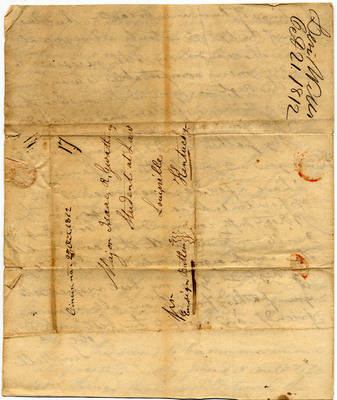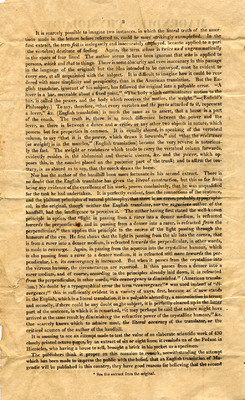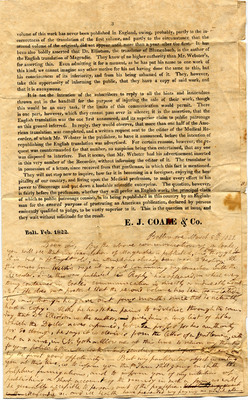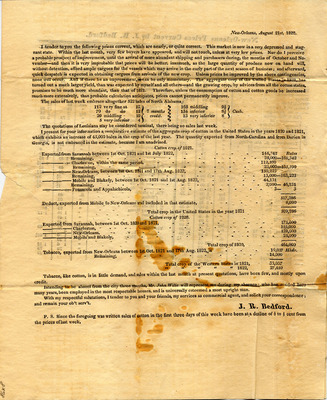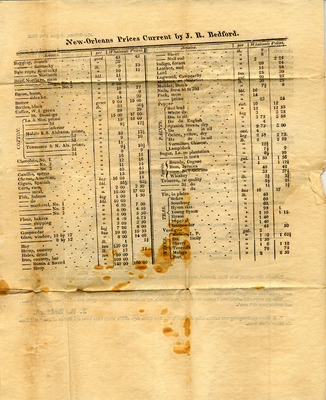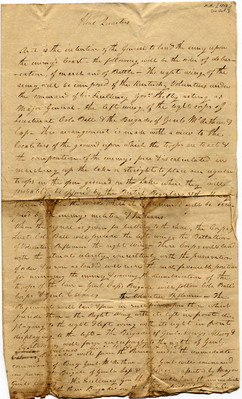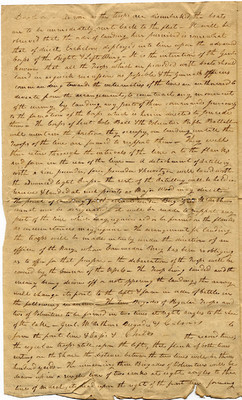Pages That Need Review
Letter from Levi Wells to Isaac Robertson Gwathmey from Fort Winchester, 21 October 1812
Page 3
feelings of beyond humane breast. The situatiotion of the 17 Reg,t is truly a [disegnceable?] one. Shoes and every other necessary to render men comfortable is wanting in this Reg,t. You will consider that this is a private letter and intended only for your own use.
My father sends his compliments to you and your father and family. I have a few days ago received an appointment as an Ensign in the 77 Reg,t Infty. commanded by Colon Russell. I will continue with this army until the campaign is over, when I will [join?] my Reg,t.
Give my best respects to your father,s family and all enquiring friends, and accept the best wishes of your Obt. St. Levi Wells
Page 4
Levi Wells Oct 21. 1812
Cincinnati 27. Oct. 1812 Major Isaac. R. Gwathmey Student at Law Louisville Kentucky
[?] Ensign Butler
Magendie's Physiology medical publication, February 1822
Page 1
[5 March 1822]
MAGENDIE'S PHYSIOLOGY.
The Publishers of the American Translation of MAGENDIE'S PHYSIOLOGY, having seen a handbill from James Webster, the object of which is to invalidate the testimony given in favour of that publication, by several of the most eminent scientific men in the United States, in letters to the translator, and thereby to injure the sale of said work, conceive it their duty to make the following remarks. The purport of the letters referred to is, that the American is superior the the English translations, and that the author of the latter is equally ignorant of his own language and that of the science of physioloygy &c. The design of the handbill is to show that these assertions are not true, and for this purpose two exracts are made, from each translation and the original, and then compared. As these have been selected by one interested to prove the superiority of the English to the American, it is but fair to suppose that these are among the best specimens ofthe former, and the worst of the latter work. The value of the translation does not necessarily consist in being literal, because, so much do lanuages differ from each other, that what is good grammer and good sense in one language, may become ungrammatical and absurd when lierally renderedd into another.But the excellence of every translation must consist in conveying the ideas of the original, in clear and simple language, and in a style natural and easy. Hence to be good translator, a man must be well acquainted with the foreign lauguage, his own, and the subect treated of. If unacquainted with the first two requisites, the translqtion must necessarily and inaccurqte, and if ignorant of the last, he cannot fail to follow the originalinto and obscurity of expression, or absolute error into which it may accidenally fall. Magendie's Physiology is certainly remarkably free from error, yet, like every other human production, it has some inaccuracies. In the two short extracts from the English translation, brought forward by its friends to show its excellence, unquestionable evidence is afforded, that the English translator was grossly deficient in all these respects. The following are the extracts contained in the handbill above alluded to. "Le poide des organes que la colonne vertbrale soutient se faimsant sourtout sentir sur sa partie anterieure, dees muackes places le long de sa partie posterieure resistent a la tendance qu'elle aurait a se porteien avant. Dans cettecirconstnce, chque vertbre, et les qui s'y attachet, representent in lervier du premier genre, dont le poit d'appui est dans le fibro-cartilage qui soutient la vertere; la puissance, dans les parties qui l'attirent en avant; et la resistance, dans les muscles qui s'attachent a ses apophyses epineuese et transverese."
AMERICAN TRANSLATION.- "The weight of the organs which the vertebral column sustains, causing it to incline forward, there are muscles placed along its posterior part which resist this tendency. Under these circumstances, each vertebra, and part of whh it is composed, represent a lever of the first kind, of which the fulcrum is in the fibro-cartilage which sustains the vertebrq; the power in the muscles which draw it backward, and which are attched to the spinous and transverse processes, and the weight orresistance in those parts which draw it foward."-Page 147.
ENGLISH TRANSLATION.- "The weight if the organs supported by the vertebral column, being felt especially at the forepart, muscles placed along its posterior part, resist the ich it has to fall forwards. Under these circumstances, every vertebra, and the parts attached to it, represents a lever of the first kin, whose point of support is the fibro-cartilage which sustains the vertebra; whose powers is in the parts which draw it forwards; and whose resistance is in the muscles which are attached to its sponous and transverse processes."- Page 174
Again: from the original when speaking of the Vitreous Body, page 85. "Le corps vitre a une fore refringente moindre que le cristallin, par consequent les rayons de lumiere, qui apres avoir traverse le cristallin, penetrent dans le corpsvitre, s'ecartent de la perpendiculaire au point de contact. "Son usage rekativement a la marche des rayons dan l' il est donc d'augmenter leur convergance."
AMERICAN TRANSLATION.- "The vitreous humour possesses a less degree of refracting power than the crtstallin; of consequence the rays of light wgich, after having traversed the crystalline, penetrate into the vitreous humour, are drawn from the perpendicular at the point of contact. its used, then, as resects the direction of the rays in the eyes, is to diminish their covergency." .... Page 43.
ENGLISH TRANSLATION....."The vitreous body has a less refracting force than the crytalline, and consequently the rays of light penetrating it after passing through the crystalline, incline for the perpendicular at the point of contact. "its use in regard to the course of the rays in the eye, is therefore to increase their convergency.".....Page 40.
Page 2
Is is scarcely possible to imagine two instances, in which the literal truth of the assertions made in the letters before referred to, could be more strikingly exemplefied. In the first extract, the term felt is inelegantly and inaccurately employed, because applied to a part (the vertebra) destitute of feeling. Again, the term whose is twice used ungrammatically in the space of four lines! The author seems to have been ignorant that who is applied to persons, which and that to things. There is some obscurity and even inaccuracy in this passage in the language of the original; but the idea intended to be conveyed, must be evident to every one, at all acquainted with the subject. It is difficult to imagine how it could be rendered with more simplicity and perspicuity, than in the American translation. But the English translator, ignorant of his subject, has followed the original into a palpable error. "A lever is a bar, moveable about a fixed point." "The body which communicateds motion to the bar, is called the power, and the body which receives the motion, the weight."--(Enfield's Philosophy.) To say, therefore, "that every vertebra and the parts attached to it, represent a lever," &c. (English translation) is much the same as to assert, that a horse is a part of the coach. The truth is, there is as much difference between the power and the lever, as there is between a dunce and a critic, or any other two objects in nature, which possess but few properties in common. It is equally absurd, in speaking of the vertebral column, to say "the it is the power, which draws it forwards," and "that the resistance (or weight) is in the muscles," (English translation) because the very reverse is norotiously the fact. The weight of resistance which tends to carry the vertebral column forwards, evidently resides in the abdominal and thoracic viscera, &c. and the power, which opposes this, in the muscles placed on the posterior part of the trunk; and to affirm the contrary, is as absurd as to say, that the coach draws the horse.
Nor has the author of the handbill been more fortunate in his second extract. There is no doubt that the English translator has given the literal construction, but this so far from being any evidence of the excellence of his work, proves conclusively, that he was unqualified for the task he had undertaken. It is perfectly evident, from the connections of the sentence, and the plainest principles of natural philosophy, that there is an error, probably typographical, in the original, though neither the English translator, nor the sagacious author of the handbill, had the intelligence to perceive it. The author having first stated the well-known principle in optics, that "light in passing from a rarer into a denser medium, is refracted towards the perpendicular, and in passing from a denser into a rarer, is refracted from the perpendicular," then applies this principle to the course of the light passing through the humours of the eye. He first shows that the light in passing from the air into the cornea, that is from a rarer into a denser medium, is refracted towards the perpendicular, in other words, is made to converge. Again, in passing from the aqueous into the crystalline humour, which is also passing from a rarer to a denser medium, it is refracted still more towards the perpendicular, i.e. its convergency is increased. But when it passes from the crystalline into the vitreous humour, the circumstances are reversed. It then passes from a denser into a rarer medium, and of course, according to the principles already laid down, it is refracted from the perpendicular in other words, "its convergency is diminished"* (American translation.) No doubt by a typgraphical error the term "convergence"* was used instead of "divergence;" this is sufficiently evident in a variet of ways, first, because as it now stans in English, which is literal translation , it is a palpable absurdity, a contradiction in thers; and secondly, if there could be any doubt on the subject, it is perfectly cleared up in the latter part of the sentece, in which it is remarked, "it may perhaps be said that the nature might have arrived at the same results by diminishing the refractive power of the crystalline humor," &c. One scarcely knows which to admire most, the literal accuracy of the translator, or the critical acumen of the author of the handbill. It is amusing to see an attempt made to test the value of an elborate scientific work of 430 closely printed octavo pages, by extract of six or eight lines; it reminds us of the Pedant in Hierocles, who having a house to sell, brought a brick in his pocket as a specimen. The publisher thing it proper on this occasion to remark, notwithstanding the attemp whoch has been made to impress the bpublic with the belief, that as English translation of Magendie will be published in this country, they have good reasons for believing that the second *See the extract from the orginal.
Page 3
3 volume of this work has never been published in England, owing, probably, partly to the incorrectness of the translation of the first volume, and partly to the circumstance that the second volume of the original, did not appear until more than a year after the first. It has been also boldly asserted that Dr. Elliotson, the translator of Blumenbach, is the author of the English translation of Magendie. They know of no higher authority than Mr. Webster's, for asserting this. Even admitting it for a moment, as he has put his name to one work of this kind, we cannot imagine any other motive for his not having done the same to this, but his consciousness of its inferiority, and from his being ashamed of it. They, however, take this opportunity of informing the public, that they have a copy of said work, and that is is anonymous.
It is not the intention of the subscribers to reply to all the hints and innuendos thrown out in the handbill for the purpose of injuring the sale of their work, though this would be an easy task, if the limits of this communication would permit. There is one part, however, which they cannot pass over in silence; it is the assertion, that the English translation was the one first announced, and its superior claim to public patronage on this ground inferred. In reply, they would observe, that more than one half of the Ame- rican translation was completed, and a written request sent to the editor of the Medical Recorder, of which Mr. Webster is the publisher, to have it announced, before the intention of republishing the English translation was advertised. For certain reasons, however, the request was countermanded for that number, no suspicion being then entertained, that any one was disposed to interfere. But it seems, that Mr. Webster had his advertisement inserted in this very number of the Recorder, without informing the editor of it. The translator is in possession of a letter, since received from that gentleman, in which this fact is mentioned.
They will not stop now to inquire, how far it is becoming in a foreigner, enjoying the hospitality of our country, and living upon the Medical profession, to make every effort in his power to discourage and put down a laudable scientific enterprise. The question, however, is fairly before the profession, whether they will prefer an English work, the principal claim of which to public patronage consists, in its being republished in this country by an Englishman for the avowed purpose of prostrating an American publication, declared by persons eminently qualified to judge, to be vastly superior to it. This is the question at issue, and they wait wihout solicitude for the result.
E. J. Coale & Co.
Balt. Feb. 1822.
Baltimore March 5th 1822
Dear Sir, By the above communication of Mr. Coale you will see that my translation of Magendie is published, and ^that though it it is but a fortnight old, an attempt has already been made to destroy ^it. All this arises from Webster's rage at my not continuing my connection with the Recorder. Since this was published his "Reply" has appeared, in which every thing contained in Coale's communication is directly or indirectly admit -ted. He does not pretend that the second volume has been translated in England, though he gave out four months since that he actually had a copy. Altho he has taken pains to advertise through the coun-try that Dr Elliotson is the author, and giving him a long list of titles which the Doctor never assumed, yet when pressed for his authority for so doing, he says it is derived from the letter of a gentleman, with -out a name, in N. York. Allow me at this time to return my thanks for your poite letter. Mr. Coale intends sending a few copies to Lexington by the first good opportunity. - But my particular object in writing you at this time, is to inform you that I am still going on with the sulfur fumigations, and to inform you of my intention of publishing a short account of the remedy in such a form as will be generally accessible to persons out of the profession. What with engagements writing Magendie [ac.?] and ill health have prevented my paying as much atten-
Page 4
-tion to the subject this winter as I could have wished. I have had however several very interesting cases, and my confidence in the efficacy of the remedy is rather increased. As every account which has here -tofore been published in this country, has appeared in Medical Journals but little is known respecting it out of the profession, and I am sorry to say that there have been several gentlemen ^in the Profession who, without knowing any thing about it, have undertaken to decry the Remedy, and ^there is scarcely and an individual who has manifested any interest in its success. But I would not wish to have this repeated, as it can only excite unpleasant feelings, and can do no good. But if a popular account of the remedy, in a cheap form with cases which occurred in this Country in the Practice of respectable Practitioners Physicians, can be distributed among the people, I think it will have the effect of bringing this valuable remedy into much more general use. Dr Emerson has politely offered to furnish me with all his cases, and if you will have the kindness to do the same including your brother's, as far as you are acquainted with it, I shall feel particularly obliged to you; and it will much enhance the favor to have them as soon as possible, as the season has now nearly arrived when the remedy can be used with most success. Will you be kind enough to inform me by mail when it will be in your power to send them? - I shall feel particularly obliged for observations on the remedy which your experience may have suggested.
With great respect, yours J Revere
P. S. You must excuse the form of this letter. It was the last handbill ^that Coale had, and I thought it might excite some interest. Please to pre -sent my respects to Dr. Caldwell & Mrs Caldwell.
29
To Samuel Brown M. D. Professor of the Practice of Medicine Lexington Ky. Lexington
Cotton prices handbill, New Orleans, 21 August 1822
Page 1
New-Orleans, August 21st, 1822.
I tender to you the following prices current, which are nearly, or quite correct. This market is now in a very depressed and stagnant state. Within the last month, very few buyers have appeared, and will not touch, unless at very low prices. Nor do I perceive a probable prospect of improvement, until the arrival of more abundant shipping and purchasers during, the months of October and November - and then it is very improbable that prices will be better, inasmuch, as the large quantity of produce now on hand will, without detention, afford ample cargoes for the vessels which may arrive in the early part of the next season of business: and afterward, quick despatch is expected in obtaining cargoes from arrivals of the new crop. Unless prices be improved by the above contigencies, none will occur. And if there be an improvement, it can be only momentary. The aggregate crop of the United States in 1821, has turned out a much larger yield, than was expected by myself and all others - and the growing crop, by advices from all the cotton states, promises to be much more abundant, than that of 1821. Therefore, unless the consumption of cotton and cotton goods be increased much more extensively, than probable calculation anticipates, prices cannot permanently improve.
The sales of last week embrace altogether 522 bales of North Alabama:
| 112 very fine at 13 } | 168 middling | 9 1/2 | } | |
|---|---|---|---|---|
| 70 do do 12 } | 7 months } | 134 inferior | 8 3/4 | } Cash. |
| 20 middling 10 } | credit } | 13 very inferior | 8 | } |
| 5 very inferior 4 } |
I present for your information a comparative estimate of the aggregate crop of cotton in the United States in the years 1820 and 1821, which exhibits an increase of 45,000 bales in the crop of the last year. The quantity exported from North-Carolina and from Darien in Georgia, is not embraced in the estimate, because I am unadvised.
| Cotton crop of 1821. | |
|---|---|
| Exported from Savannah, between 1st Oct. 1821 and 1st July 1822, | 144,342 Bales |
| Remaining, | 25,000 - 169,342 |
| — Charleston, within the same period, | 112,590 |
| Remaining, | 23,000 - 135,590 |
| — New-Orleans, between 1st Oct. 1821 and 1st Aug. 1822 | 150,223 |
| Remaining, | 13,000 - 163,223 |
| — Mobile and Blakely, between 1st Oct. 1821 and 1st Aug. 1822, | 44,131 |
| Remaining, | 2,000 - 46,131 |
| Pensacola and Appalachicola, | 3- 3 |
| 517,286 | |
| Deduct, exported from Mobile to New-Orleans and included in that estimate | 8,000 |
| Total crop in the United States in the year 1821 | 509,286 |
| Cotton crop of 1820. | |
| Exported from Savannah, between 1st Oct. 1820 and 1821, | 175,000 |
| — Charleston, | 125,000 |
| — New-Orleans, | 139,000 |
| Total crop of 1820, | 464,000 |
|---|---|
| Tobacco, exported from New-Orleans between 1st Oct. 1821 and 17th Aug. 1822, is | 19,037 Hhds. |
| Remaining, | 14,000 |
| Total crop of Western State in 1821 | 33,037 |
| " " " " " 1822, | 27,450 |
Intending to be absent from the city three months, Mr. John Wilie will represent me during my absence: who has resided here many years, been employed in the most respectable houses, and is universally esteemed a most upright man.
With my respectful salutations, I tender to you and your friends, my services as commercial agent, and solicit your correspondence; and remain your ob't serv't.
J. R. Bedford
P. S. Since the foregoing was written sales of cotton in the first three days of this week have been at a decline of 1/4 to 1/2 cent from the prices of last week.
Page 2
New-Orleans Prices Current by J. R. Bedford.
| Articles. | Per | Wholesale | Prices. | Articles. | Per | Wholesale Prices. | |
|---|---|---|---|---|---|---|---|
| Bagging Scotch | yard. | 40 | 42 | -Sheet | lb. | 9 | |
| -Kentucky | " | 30 | -Nail rod | " | 8 | ||
| Bale rope, Kentucky | lb. | 9 | 10 | Indigo, flotant | " | 2 | 2 25 |
| -Northern | " | 10 | 11 | Leather, soal | " | 20 | 24 |
| Beef, Northern, Mess | bbl. | 11 | Lard | " | 15 | 18 | |
| -Cargo, No 1 | " | 9 | Logwood, Campeachliy | lon | 25 | 30 | |
| -No. 2 | " | 6 50 | Molasses, on plantation | gal. | 20 | 25 | |
| Bacon, hams, | " | 10 | 12 | Madder, Dutch | lb. | 20 | 25 |
| -sides &c. | " | 8 | 9 | Nails, from 4d to 20d | " | 7 1/2 | 8 |
| Butter | " | 14 | 20 | Pork, mess | bbl. | 16 | |
| Bottles, black | Groce | 9 00 | 10 00 | -prime | " | 14 | |
| Coffee, W. I. green | lb. | 30 | 50 1/2 | Pepper | " | 23 | 24 |
| -St. Domiago | " | 28 | 29 | PAINTS. {Red lead | ewt. | 10 | 12 |
| COTTON. {La. & Miss. Prime | " | 16 00 | 17 00 | PAINTS. {White do. | " | 12 | 12 50 |
| COTTON. {-2d | " | 13 | 15 00 | PAINTS {Do in oil | keg | 3 | 3 25 |
| COTTON. {-inferior | " | 9 1/2 | 12 1/2 | PAINTS. Do do English | " | 3 75 | 3 88 |
| COTTON. {Mobile & S. Alabama, prime, | " | PAINTS. {Spanish brown, dry | " | 4 | |||
| COTTON. {-2d | " | 10 | 12 1/2 | PAINTS. {Do do in oil | " | 2 75 | 3 00 |
| COTTON. {-3d | " | 9 | 10 | PAINTS. {Ochre, yellow, dry | lb. | 2 | 2 50 |
| COTTON. {Tennessee & N. Ala. prime, | " | 11 | PAINTS. { Do do in oil | keg | 2 55 | 2 75 | |
| COTTON. {-2d | " | 9 1/2 | 10 1/2 | PAINTS. {Vermilion, Chinese, | lb. | 2 | 2 50 |
| COTTON. {-3d | " | 8 | 9 | PAINTS. {Lanipblack | " | 12 1/2 | |
| Chocolate, No. 1 | " | 16 | 18 | Sugar, La. on plantation | " | 7 1/2 | 9 |
| -No. 2 | " | 12 | 16 | -in town | " | 8 1/2 | 10 |
| -No. 3 | " | 11 | 14 | Spirits. {Brandy, Cognac | gal. | 1 50 | 1 56 |
| Candles, sperm | " | 40 | 43 | Spirits. {Rum, Jamaica | " | 1 | 1 12 1/2 |
| Cheese, American | " | 15 | 18 | Spirits. {-New-Orleans | " | 40 | 42 |
| Cigars, Spanish | box | 16 00 | 18 | Spirits. {Whiskey | " | 35 | 37 1/2 |
| Corn, ears, | bbl. | 56 1/2 | 62 1/2 | Tobacco, 1st quality | lb. | 3 1/2 | 2 3/4 |
| -meal, | " | 2 00 | 2 50 | -2d do | " | 2 1/2 | 2 3/5 |
| Fish, Salmon | " | 16 00 | 17 00 | -x do | " | 1 1/4 | 1 3/4 |
| -do | keg | 1 00 | 1 50 | Tin, in plates | box | 16 | 17 |
| -mackerel, No. 1 | bbl. | 10 00 | TEAS. {Bohea | lb. | 40 | ||
| -No. 2 | " | 6 50 | 7 00 | TEAS. {Souchong | " | 60 | |
| -No. 3 | " | 4 00 | 4 50 | TEAS. {Hyson skin | " | 95 | 1 |
| Flour, bakers | " | 5 00 | 5 50 | TEAS. { Young Hyson | " | 1 10 | 1 15 |
| -shipping | " | 4 50 | 4 75 | TEAS. {Hyson | " | 1 10 | 1 15 |
| -sour | " | 3 00 | 3 40 | TEAS. {Imperial | " | 1 40 | |
| Gunpowder | Keg | 7 00 | 8 00 | TEAS. {Gunpowder | " | 1 40 | |
| Glass, window, 10 by 12 | box | 10 00 | 16 50 | Verdigris | " | 45 | 50 |
| -8 by 12 | " | 8 00 | 14 00 | WINES. {Maderia, L. P. | gal. | 3 | |
| Hay | lb. | 1 | 1 1/2 | WINES. {Do, Sicily | " | 1 50 | 1 62 1/2 |
| Hemp, country | ton. | 130 00 | WINES. {Sherry | " | 1 50 | ||
| Hides, dried | lb. | 12 | 15 | WINES. {Teneriffe | " | 1 6 | 1 12 |
| Iron, country, bar | ton | 90 00 | WINES. {Malaga | " | 70 | 75 | |
| -Russia & Sweed | " | 100 00 | WINES. {Port | " | 2 | 2 50 | |
| -Hoop | " | 140 00 | 160 00 |
William Henry Harrison battle orders, ca. October 1813
Page 1
n. d. [1813] [on. Oct.]
Head Quarters
As it is the intention of the General to land the army upon the enemy's Coast - the following will be the order of debar-cation, of march and of Battle - The right wing of the army will be composed of the Kentucky Volunteers under the command of his Excellency Govr Shelby acting as Major General - the left wing of the light corps of Leuitenat Colo. Ball & the Brigades of Genl. McArthur & Genl Cap - This arrangement is made with a view to the localities of the ground upon which the troops are to act & the composition of the enemy's force & is calculated in marching up the lake or straight to place our regular troops in the open ground on the Lake where they will probably be opposed by the British Regulars [torn crease] Volunteers in the woods which it is presumed will be occupied by the enemys militia & Indians.
When the signal is given for putting to the shore, the Corps of Lieut. Colo Ball will precede the left wing - the Battallion of Volunteer Riflemen the right Wing - These Corps will land with the utmost celerity consisttenly with the preservation of order & as soon as landed will [???] the most favourable position for annoying the enemy & covering the disembarcation of the troops of the line - Genl. Cap's Brigade will follow Colo. Ball's Corps & Genl. Calmes [gap] the Volunteer Riflemen - The Regiments will land & form in succession upon those which precede them - the Right Wing with its left in front displaying to the right & left wing with its right in front displaying to the left - The Brigades of Genls. Rings Allery & Caldwell will form successively to the right of Genl. Childs Calmes Calmes [insertion- Genl McArthur & Childs Brigades will form the Reserve under the immediate command of Brig. Genl. McArthur - The Genl. will command in person the Brigade of Genls. Cap & Calmes assisted by Major Genl. [???]. His Excellency Gov. Shelby will have the immediate command of the three Brigades on the right assisted by Major Genl
Page 2
[Douglas?] - As soon as the troops are disembarked, the boats are to be immediately sent back to the fleet. It will be observed that the order of landing here prescribed is somewhat that of direct Echelon deployed into line upon the advanced Corps of the Right & Left Wing. It is the intention of the Genl. however that all the Troops which are provided with boats should land in as quick succession as possible & the General Officers commanding towards the extremities of the line an authorized to deviate from the arrangements, to counteract any movement of the enemy by landing any parts of their command, previously to the formation of the Corps which is herein directed to precede them. The Corps of Leut. Colo. Ball & the Voluntier Rifle Battallion will maintain the positions they occupy on landing untill the Troops of the line are formed to support them. They will then retire through the intervals of the line or to the flanks and form in the rear of the line. A detachment of artillery with a six pounder, four pounder & howitzer will land with the advanced light Corps. The rest of the artillery will be held in reserve & landed at such points as Major Wood may direct. The point of landing for the reserve under Brig. Gen. McArthur cannot now be designated. it will be made to support any part of the line which may require aid or be formed on the flanks as circumstances may require. The arrangement for landing the troops will be made entirely under the direction of an officer of the Navy whom Commodore Perry has been so obliging as to offer for that purpose. The debarcation of the Troops will be covered by the Cannon of the Vessels. The Troops being landed and the enemy being driven off or not opposing the landing, the army will change its front to the left & form in order of battle in the following manner. The two Brigades of Regular Troops and two of Volunteers to be formed in two lines at right angles to the shore of the lake. Genl. McArthurs Brigade & Cavalry to form the front line & [Cap's & Childs?] - the second line; the regular troops still upon the left, that flank of both lines resting on the shore _ the distance between the two lines will be three hundred yards. The remaining three Brigades of Volunteers will be drawn up in a rough line of two ranks at right angles to the line of march, its head upon the right of the front line forming

